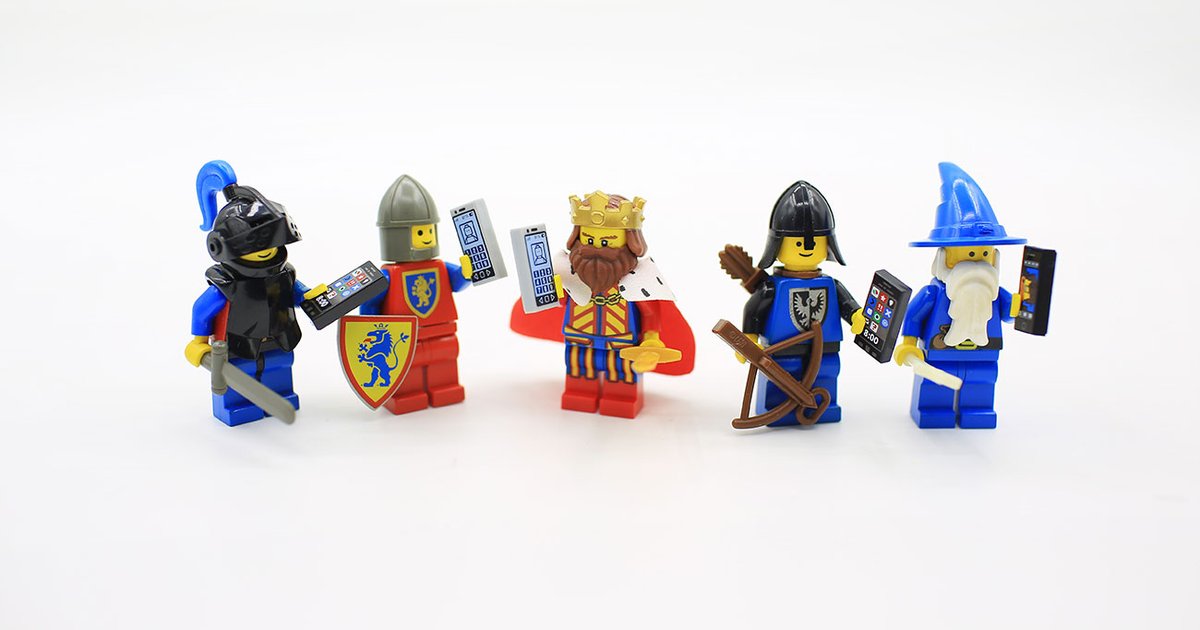“How should I educate my children to use a smartphone?”
My daughter was nine when she tugged on my sleeve in the middle of the morning chaos. I was standing with six drums, three gym bags and a sponsor run form in my hands, bonjouring everyone outside, but saw that she was serious and sat down with her. She told her what she had on her mind: she had been with a friend two weeks earlier. My daughter didn’t notice that the girl was making a movie of her with her iPhone while she was dancing crazy. She doesn’t have a cell phone herself.
Article continues after the ad
The girlfriend showed the video from afar, my daughter was ashamed and shouted, “No, delete it!”, To which the girl sent it at the touch of a button. “What are you doing?” Asked my daughter. “I sent it to the class group app,” the friend replied with a laugh, while the reactions were already pouring in. My daughter had been walking around with it for two weeks; first because she didn’t want to be difficult, later because she was afraid I would call the girl’s mother.
Contents
Using a smartphone
It seems like a harmless incident, but I saw myself confronted with two essential questions: when and how should I educate my children to use a smartphone and how do I deal with parents who have different or no thoughts about it? I realized how offensive such a conversation would be if it ever happened. “Yes, hello. Is it true that your nine-year-old daughter already has a smartphone? Do you realize she’s in all kinds of group apps? Did you explain to her how to deal with this? Have you discussed that she must ask permission to use someone else’s image? Do you keep an eye on what she is up to online and whether there is being bullied? ”
Don’t type in a cat
I’m not the foamy-mouth type and besides, they were questions I hadn’t even asked myself. Of course, over the years and giving birth, a kind of screen policy had emerged indoors (never touch your mother’s computer or phone if you want to close your childhood with ten fingers, do not install games without permission and do not type ‘cat’ into Google) , but I had not yet had a conversation with them about mobile use – let alone sending apps or social media. Probably because I decided my kids wouldn’t get a cell phone before they go to high school anyway.
I see more and more boyfriends and girlfriends in their environment from grade five or six with a smartphone. But that may not say anything, because I live in the Randstad. Do I buy time by moving? Unfortunately. From the research Hey, what’s app? 8-18 year olds and mobile telephones, held by Mijn Kind Online in 2012, showed that children throughout the Netherlands are getting their own telephone at an increasingly younger age, and increasingly with the internet. More than a quarter of eight-year-olds, half of ten-year-olds and almost one hundred percent of twelve-year-olds have one.
Candy jar
I talk about it with Remco Pijpers, Youth and Media expert and father of three children. “My wife and I have a fairly strict policy. The children don’t get a phone until they go to seventh grade. The fascination of children with technology is so great – it is like putting down a candy jar and expecting that they will not eat themselves sick. ”
The numbers support his story. By the time children are thirteen, they send more than a hundred WhatsApp messages a week. That eventually amounts to about five hundred. And then we are not even talking about other internet use.
Always available
Remarkable: with young children this usually involves contact with their mother, and this is in line with the reason often mentioned by parents for buying a mobile phone for their son or daughter: then you can reach your child when they play outside, go to school , is on his way to a club. This is also evident when I talk about it with other parents. When I ask why their child has a smartphone, most of them respond with a shrug, “Why not?” As if little there soul searching has preceded it. When I keep asking questions, the reason is almost always: concern. A mobile lifeline as a continuous umbilical cord.
Puncture
But doesn’t that phone offer a false sense of security, with a whole series of side effects? My starting point is: as long as I think they are too young to do certain things – cycling alone, unsupervised to the pool – I will come along. When they are at an age when they can handle the responsibility, I really give them the freedom to do it themselves. Puncture? Call somewhere or walk home. Didn’t arrive at the football club? I assume the trainer will notice. You cannot create true self-reliance with a telephone; on the contrary.
Also read
More and more children are getting a mobile phone>
Lego and gayporn
English research shows that the physical turning circle of children has become extremely much smaller in a few generations. If an eight-year-old would still roam an average of up to ten kilometers from home in 1919, in 1958 it was one and a half kilometers and nowadays only 275 meters. In 2015, a child has four square meters of play space at his disposal in the city. Out of fear of all kinds of – largely imagined – dangers in the outside world, we give our children access to another, infinitely large world that we hardly know ourselves. And that with little or no supervision, explanation or rules. That leads to absurd situations.
Children who say all kinds of things about and to each other via the app, without daring to enter into a confrontation in real life. Freely distribute photos and videos without ever having a conversation about privacy (if they already know what the word means). My then seven-year-old son who had been watching hard gay porn at the babysitting address of a friend between Lego and through. Parents who put their child to bed at nine, without knowing that it is a virtual world trip until the early hours. Real life blown control versus online freedom blown.
Kissing behind the bicycle shed
We don’t do it consciously, we just start from our own frame of reference. At that age we were busy swapping poetry pictures, lighting fires and kissing behind the bicycle shed. To us, being online means nothing more than liking a colleague’s baby photos, reading cheesy updates on LinkedIn, Googling (and maybe occasionally, and even accidentally, browsing Pornhub). You use your smartphone to make calls, as a parking meter or flash detector. On WhatsApp you are in a few chat groups with old friends, parents or sports buddies.
Meanwhile, we have no idea what our kids are up to online or on their phones, because we have no experience to fall back on – an important starting point for parenting. Now my parents did not know which tricks I played, that is precisely the importance of freedom and self-development. But they did know the world in which I explored those boundaries and established the framework: where, when, with whom and how. Especially before I went to high school.
Digital backbone
That is perhaps the essential difference with the world that a smartphone opens up: we do not know which corners of it the children’s imagination leads and therefore do not set any or only a vague boundary. Remco Pijpers: “For a long time we believed that children would naturally become wise in the field of smartphones, internet and technology. But that’s a fable: recent research shows that your digital spine does not grow by itself, a child must be helped to do that. How digitally literate children are, mainly depends on the home situation. The school has hardly any influence on this. That means quite a bit: children of higher educated parents develop even faster, children where nothing is happening at home stand still. ”
Just as the sexual revolution put the importance of information at home and at school on the map, the digital revolution now requires the same change. This information should only start at an even earlier age, also because you do not know how supervision is elsewhere – for example, I no longer need to explain to my son how men have sex.
It takes a village
I haven’t changed my mind about owning a phone in elementary school. On the contrary, I am strengthened in the fact that my three children should first and foremost have the opportunity to become resilient in real life. Opportunity to get to know themselves and their environment without descending into that other, gigantic, virtual world on their own. Opportunity to experience how group dynamics work, without already being in group apps or on social media.
On the other hand, I will consciously give them more physical freedom. With good agreements, without the false security of a telephone. In the meantime, I familiarize them with the digital world, so that they see the numerous possibilities and cultivate the backbone to use them sensibly. Parents in my area, I give a copy of this article so that we can start the conversation, because this is not a topic to pass up until our children go to high school. We can think ‘everyone for himself’, or try to be involved with each other’s children.
Especially if we give them a little more freedom, it is nice to know that other parents are watching and do not have as a starting point: that child just calls his father or mother. Because despite all that progress, the African saying remains true: It takes a village to raise a child. Not a phone.
This article has previously appeared in Kek Mama.
More Kek Mama? Subscribe now and take advantage of great offers!



